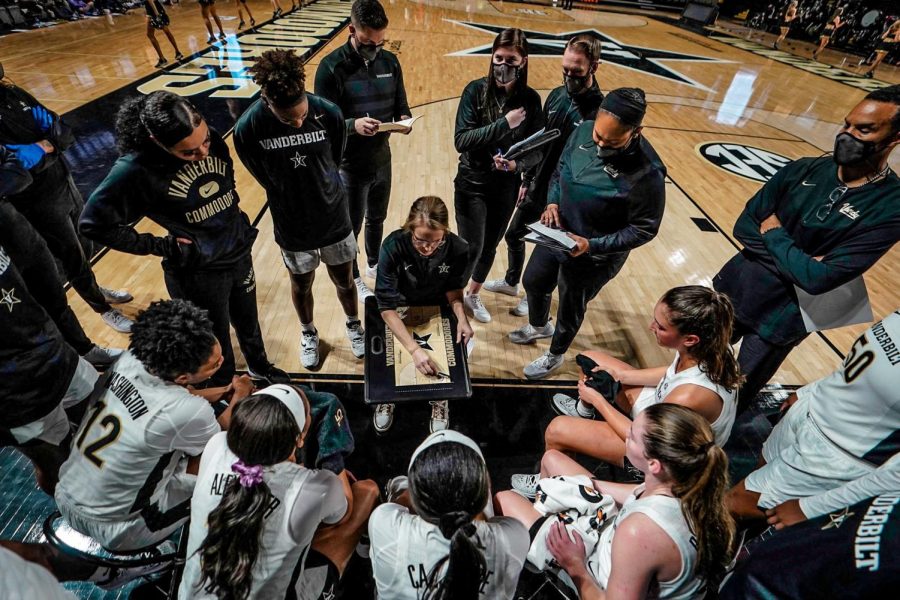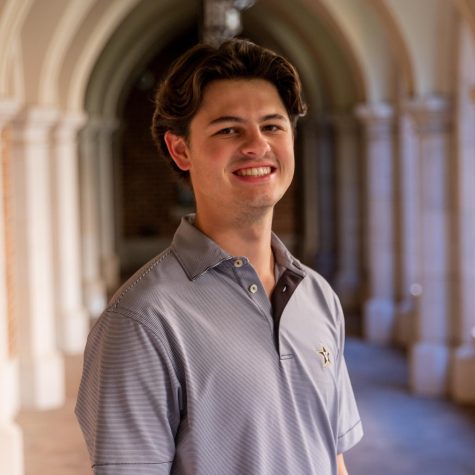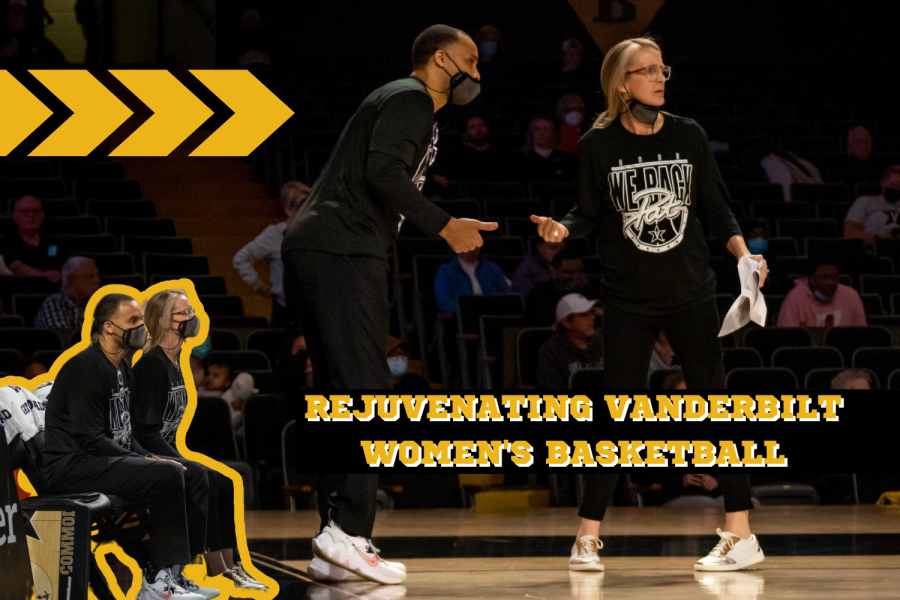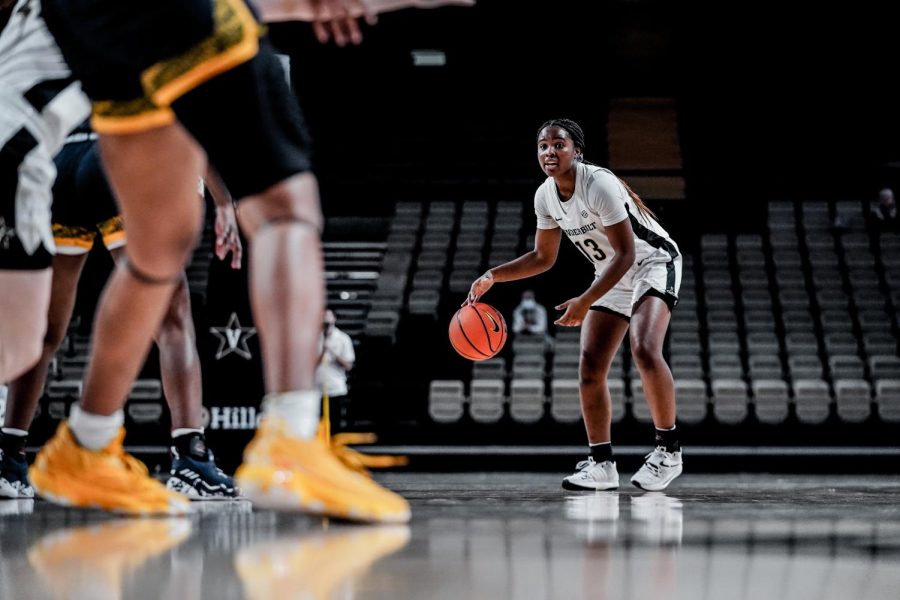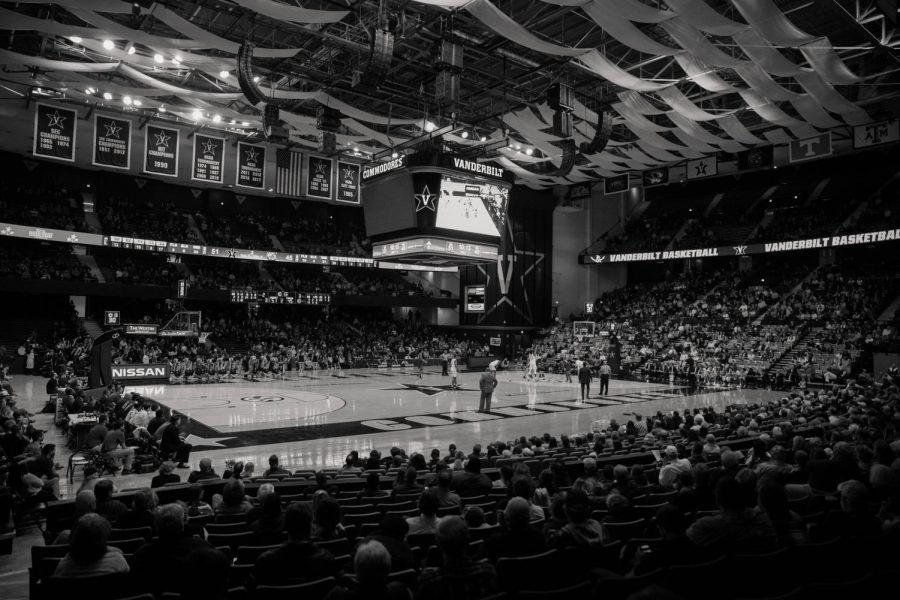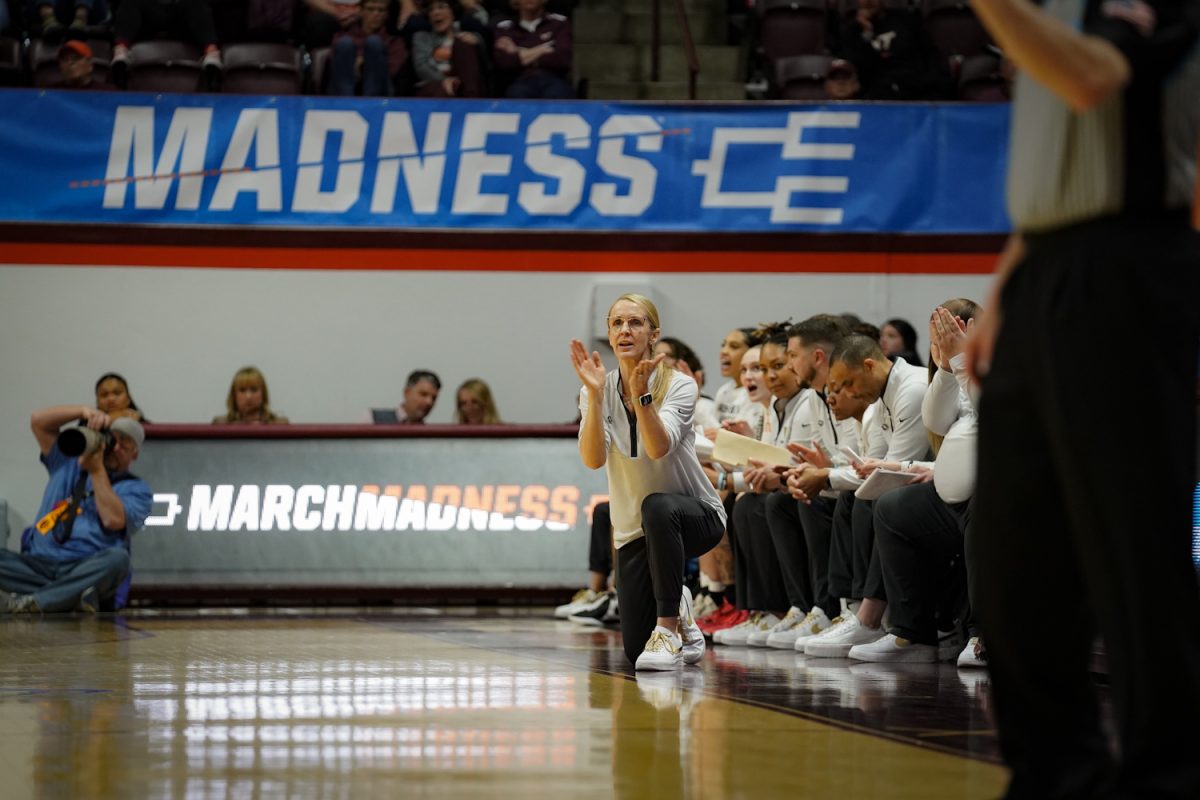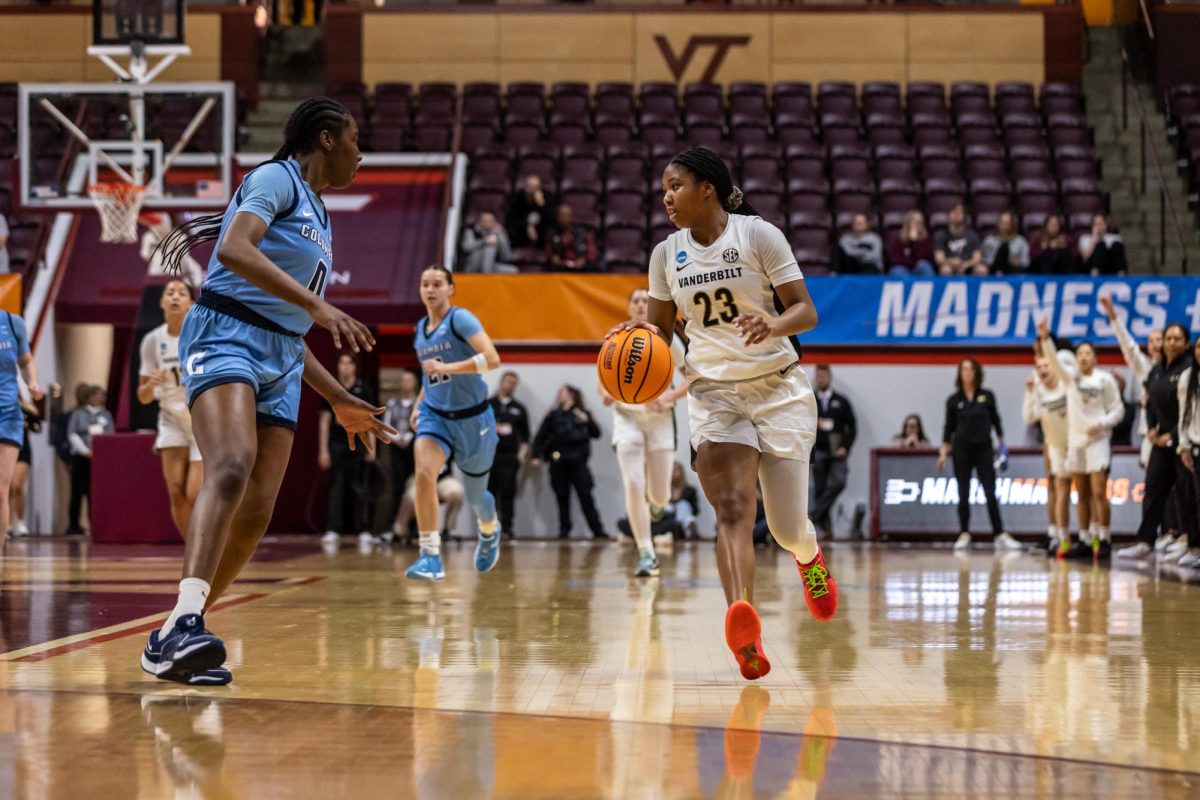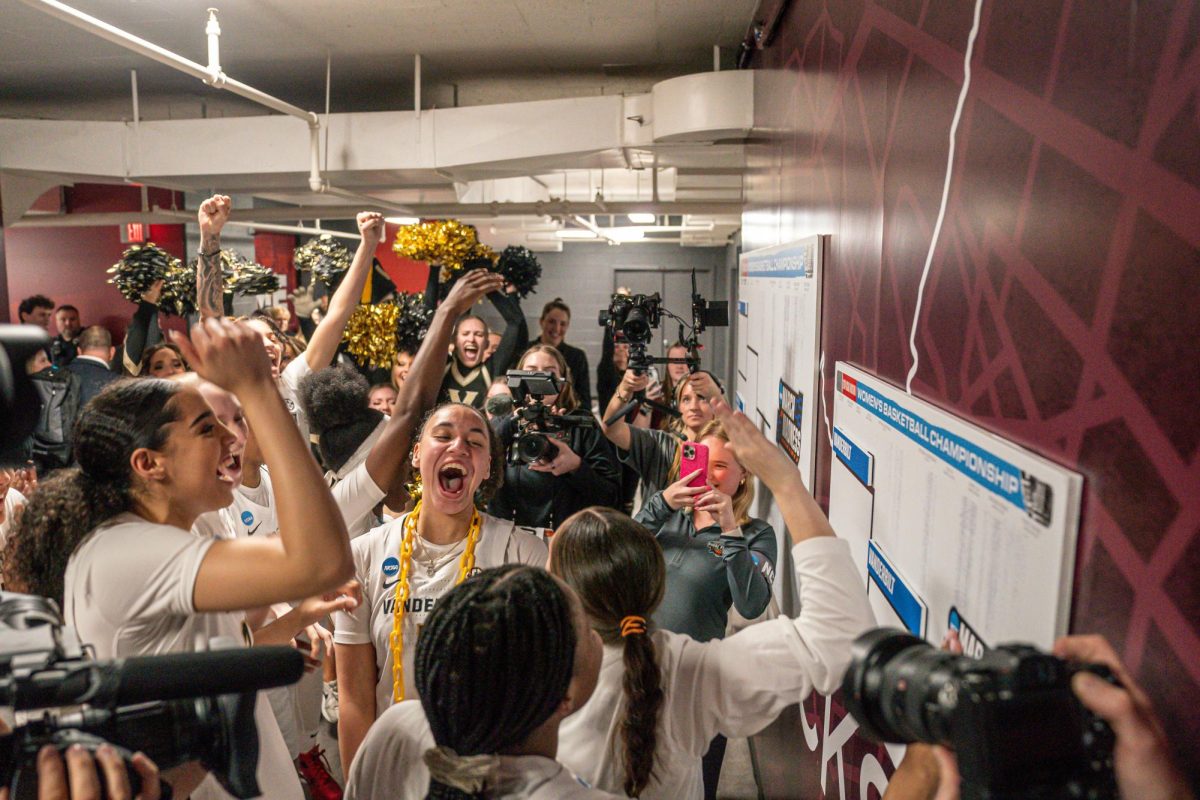Vanderbilt women’s basketball coach Shea Ralph joined Justin Hershey and Bryce Smith on The Hustler Sports 30 Podcast last week to discuss her team’s season thus far. Ralph touched on lessons learned working with UConn head coach Geno Auriemma, how she was able to keep her freshmen commitments on-board through a coaching change and how satisfied she has been with her team’s performance thus far. Below is a full transcript of her time on the podcast.
Vanderbilt Hustler: You took over a team that you were hardly familiar with that had many players you might never have watched. How did you strike a balance between letting the players show you what schemes and things worked best while also trying to implement your own philosophies?
Shea Ralph: It’s a delicate balance and to be honest with you, it’s not something that has been completely figured out yet—still getting to know each other, both on and off the court. That kind of relationship and the genuine pillars of it take time and patience on both parties. Sometimes you know right away that it’s not going to work out, sometimes it takes a little bit longer. We’ve been really pleasantly surprised that our players—I wouldn’t use the word surprised—but I’m very happy that we connected as well as we have with them, and they’re a great group. I’ve really enjoyed working with them. We have a long way to go, but the consistency of how we build our relationships and the things that we talk about, and the ways that we do that in actions every day are what’s really important. So I try not to look too far behind[or] too far ahead. It was a clean slate for everyone. I didn’t really want anyone to tell me much about what happened before I got here. I wanted to learn my players and give them an opportunity to show me who they were. And I think that they’ve given me the same opportunity, and it’s been great so far.
Geno Auriemma is on the Mount Rushmore of women’s college basketball. What is the most valuable lesson that you learned from him either as a player or assistant?
I think probably more than anything, he taught me resiliency. So understanding that things always work out the way that they should and that whether you’re a basketball player or coach or a teacher, you’re never going to make everybody happy. You’re never always going to be liked by everybody. And I grew up as a people pleaser, I wanted to make everybody happy. But in the real world, it’s much more impactful and powerful to be respected. So he taught me that when I played [at UConn], it enabled and gave me an opportunity to learn how to grow in uncomfortable situations, to accept constructive criticism, to be part of conflict and it doesn’t have to be a blow up or an emotional thing. It’s just part of growing and becoming better, especially within a team. And when you’re talking about a team of women, that’s going to happen, right that’s going to happen and it also taught me how to mentor and guide players through that. I’ve played and coached for almost half of my life. So I would say the biggest takeaway from my experience in Connecticut is in order to be great at anything in life, in order to have the kind of impact that I want to have on my players and the kind of impact that my coaches had on me, you have to be resilient, and you have to be consistent in terms of the things that you can control every day. I wake up and I choose to be happy because I get to do what I love in a place that I love doing it, around great people, with my husband. And some things that happen every day aren’t fun, but they’re part of us growing and they’re essential. So that would probably—there’s a lot that I’ve learned—but that would be number one.
When do you think you knew that you were ready to take on a head coaching role?
I knew that I wanted to be [a head coach], I don’t think that I ever in my mind thought that I had to be—like, I have to be a head coach this year, and I’m just going to go where I get the opportunity. What I learned over my career was that it had to be the right place. There has to be the right kind of support around and the right things that are going on within that program that you can’t buy in terms of people and the people that I hire, the people that I work for, our support and administration, the support within the athletic community, and it has to be the right fit for you. I think if I had just gone out looking for a head coaching job because I had to be a head coach, I would have got myself in trouble. I saw a lot of really good coaches fail for a myriad of different reasons but more than anything, it was that they either worked for the wrong people for them or they hired the wrong people. And so I really painstakingly took my time and I was in a great situation at UConn. My husband was a Division 1 head coach as well—we could have stayed in those jobs probably for the rest of our careers. But this came along and it was absolutely the right fit and the right opportunity where we knew we could do something incredibly special. And I wanted to be part of that. And there was not one inkling of like, ‘Ah should I, shouldn’t I’—this was it. The minute that I talked to Candice [Storey Lee], I wanted to be here at Vanderbilt. So for me it was that I wanted to be just I knew that I would wait as long as it took to find the right place.
Your husband came with you and is now on your staff. What did he tell you about Vanderbilt and how wonderful is it that Vanderbilt women’s basketball is now a family affair?
When he was here as an assistant, we were dating and it was always like, ‘Well, should we go to Nashville, Tennessee or Storrs, Connecticut.’ And it was always like, ‘let’s go to Nashville.’ No one wants to go to Storrs, Connecticut. So that part was always enticing for me. It’s this really incredible school that’s actually like a college campus plopped down in the middle of the city of Nashville, and there’s so many great things to do around the city. The school and the education speaks for itself, and I remember him telling me day in and day out like we’re always going to be involved with these top kids because its Vanderbilt and we’re in Nashville and we’re in the SEC and you have all these things that we can’t gloss over or configure—we have the best of everything, we do. We have everything we need to be an elite program except we’re not yet and that’s our job. That’s why we came in here, and I think knowing that and seeing him be part of it when it was being done and knowing that we want to get there and beyond is really exciting. So I remember vividly, how high he was on Vanderbilt and Vanderbilt athletics, the program, the women’s basketball program here at the school, and we talked about it a lot even when we weren’t in this job. We followed Vanderbilt. It’s a great job. He always had an affinity for Candice because she was the [senior woman administrator] at the time. So it’s just really cool how everything comes full circle.
Knowing that Candice Lee is an alum of this program, is that added pressure for you to succeed? Or does it make it even more special for you that she deemed you worthy to lead a program that is perhaps nearest and dearest to her heart?
In our job, in our business, there’s always pressure. This is a high pressure, high intensity environment, so I’ve gotten used to that and there’s no added pressure. If anything, I’m more inspired and more excited because our athletic director has such a personal investment in our program, and I’m excited to do this with her. I know how much it means to herand it also means something to me. We both were part of something pretty special in our college careers. And she’s really, really lucky to work at her alma mater just like I was working at mine the last 15 years, so I understand what that means and how exciting it is to see the lives of other student athletes impacted the way that yours was. And so being able to do this with her and for her is a dream come true. This is an opportunity of a lifetime. I’m so excited to be here. I really am.
Getting to the on-court—How satisfied have you been with your team’s defensive performances thus far?
It is exciting and I go back and forth—depending on the day that you ask me, or the quarter that we’re playing—I’m excited and I see all this growth and then we turn Depaul over 17 times in the first quarter and lose and I’m like, ‘How do you lose.’ We’ve had this exponential growth from when we started the season and that is incredibly encouraging, it’s exciting, it’s really cool to see our players continue to buy in because they are also feeling the growth and seeing how impactful their improvement is on the court and how honestly we have been competing with anyone and everyone and have been in position to win some really big games that I don’t think anyone in the universe this year thought we’d be positioned to win. So I’m excited for them in that way, but I’m also concerned that we aren’t making the same kind of growth in some other areas. But that’s my job, to make sure that we figure out a way that we can continue growing in all those areas, that all of them are important. You can stop people from scoring, but you have to be able to score to win, and so there’s definitely some things that we need to continue to focus on and get better [at]. But the fact that we’ve gotten so much better on the defensive end is super encouraging, and exciting for us as coaches because we know that there’s still so much more to do and we’ve seen them grow already, if that makes sense. We’ve seen that they can do it,so now we just have to do it more consistently and figure out a way to make the same kind of impact and growth opportunities for them on the offensive end of the court.
You were able to keep three of your four freshmen committed through the coaching change. How were you able to keep them committed and how impressed have you been by them thus far?
It wasn’t difficult. I think everyone has their own experience with that. For me, these kids wanted to come to Vanderbilt; they were coming to Vanderbilt because they wanted to be at Vanderbilt. So that made it easy to keep them on and they had already, except for Sacha Washington, signed a letter of intent. And they were ready to go. So it wasn’t as hard and for me, I didn’t know much about them. Them coming here was just like the players that we had here, like give them an opportunity to show us what they have and what they can do and an opportunity for us to build a relationship with them and let’s see where it goes. So that was kind of what happened there. It was much easier than I think people think—they just wanted to be here. In terms of their impact and how they’ve helped our team but also how they’ve grown—I mean, our team wouldn’t be the same team without our freshmen. They are obviously contributing a lot. But even more than that, they’re just a great group of young kids that have an incredible energy about them. The best teams that I’ve worked for and played on, they have something like an aura, like a feel to their personalities, to their chemistry to the fun that they had on and off the floor. And that freshmen class has a feel. There’s something really special about them. It extends beyond their talent level and skill in terms of the game of basketball. They have something special—we want to be around them, their teammates want to be around them, they impact us positively on and off the floor and we haven’t even scratched the tip of the iceberg of how good they can actually be. You’ve already seen their improvement. And just imagine what there’ll be at the end of the year and then remember, they’re going to have three more after that. So it’s exciting.
Heading into SEC play—one of the toughest conferences in the nation—how do you plan to measure success in the infancy of your tenure on West End?
We talk about that a lot on our team, like how do we define success? What does success look like for us? I don’t think that success is for us—I think I should say it this way—for us, I think success is not an event or a game or a record. Obviously, our losses and wins are going to go in that win-loss [column] and people define success around that a lot. I don’t think that’s how we can define success this year. I think we have to define our success through the process of getting to win, of getting to that event, where now we sit on the sideline and we say ‘How successful have we been in practice this last week leading up to this game?’ And learning that success is more of a destination for us. I want our players to understand that when you play really hard, when you play really smart, when you have fun, when you focus on being great teammates, communicating, competing—all these things that require zero talent, all these things that you can do that require zero talent, you can be in any game with anyone. I know that because I’ve been on both sides of it. Some of the toughest opponents that we played at Connecticut were some of the least talented teams, because they did all those things that no one else wanted to do because they had to. So when I look at our team, I want to know that we go out and we compete and people have to beat us. That we are not going to go out and lose a game—they’re going to have to go out and beat us. They’re just going to have to be better than us that day, then that, to me, is a win. It’s not a moral victory—I don’t really do those. But we want to squeeze every ounce of potential in every single way out of this team, and I want them to experience that it’s not always about how many points go into those scores, or this person lit it up. It’s about who’s the better team—that’s the great thing about team sports. And when they learn how to invest in their teammates in that way, then they learn a really valuable lesson in life. Because most great things in life are achieved within a team. Right? Your family, your work, the sports that you play, all of those things are done with other people. So to me success has a much broader meaning. And we do talk about that a lot. But we’ll see, as we get into the SEC, if we can keep them focused on our definition of success and not everyone else’s.
Answers have been edited for length and clarity. To listen to the full interview, click here.

